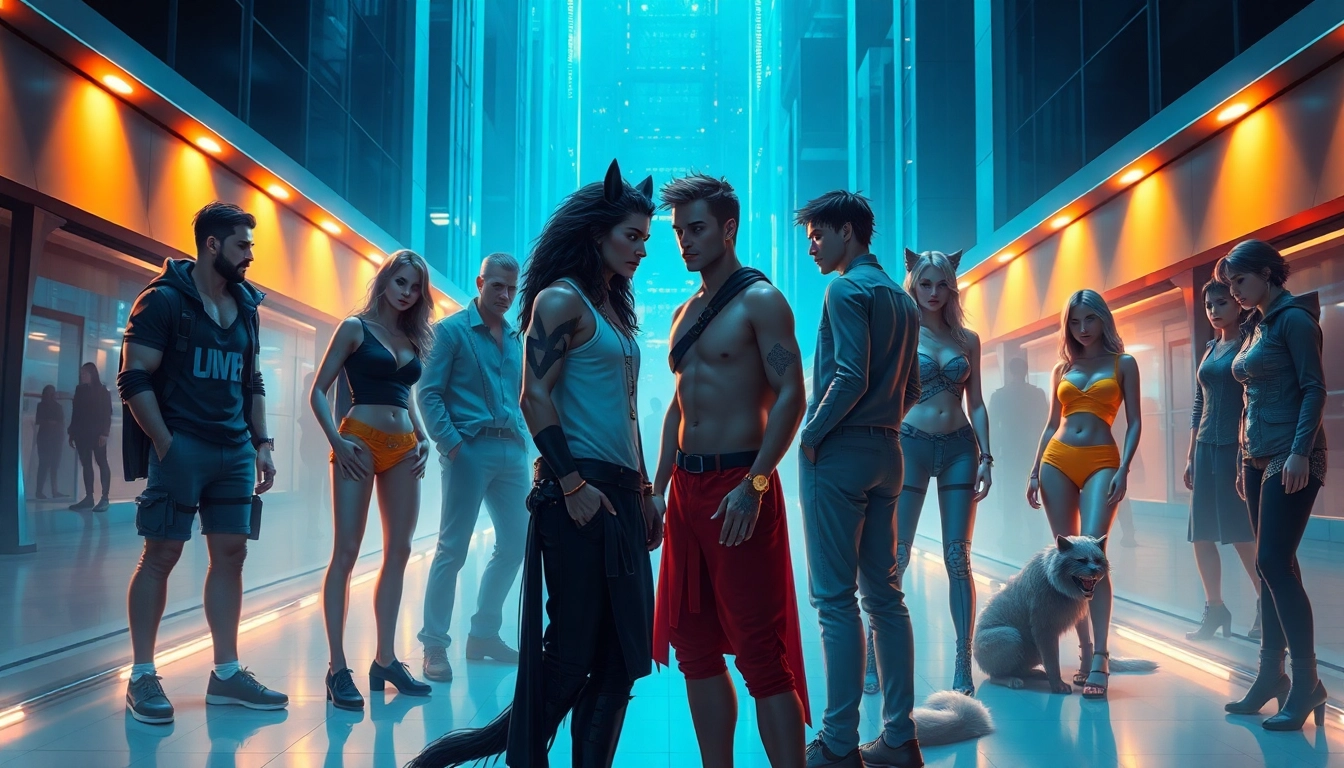Understanding the Omegaverse: A Deep Dive into Its Origins, Dynamics, and Cultural Impact
Introduction to the Omegaverse: Definition and Origins
The omegaverse, also known as A/B/O , is a unique and provocative subgenre that originated within erotic fanfiction communities. Its emergence can be traced back to the early 2010s, although its thematic roots stretch further into the realm of speculative fiction and mythic storytelling. The Omegaverse presents a fictional universe where human society is modeled after wolf pack hierarchies, creating a layered social structure based on dominance, submission, and neutrality. This framework explores complex romantic and sexual interactions that challenge conventional norms, often blending elements of fantasy, BDSM, and alternative relationship dynamics.
The core concept of the Omegaverse revolves around a hierarchical society divided into three main categories: Alphas, Betas, and Omegas. These categories are not merely labels but define individuals’ biological roles, social behaviors, and interactions. Originally, it was part of a niche within fanfiction communities—particularly in fandoms like Supernatural, Sherlock, and Naruto—but has since expanded into an independent genre with its own tropes, themes, and cultural implications. Its popularity is driven by its ability to explore taboo topics, power dynamics, and alternative identities within a safe, fictional context. Over the years, the Omegaverse has grown beyond fanfiction, influencing original works, online communities, and even discussions about sexuality and gender identity.
The Hierarchical Structure: Alphas, Betas, and Omegas
Understanding the Roles
The foundation of the Omegaverse lies in its hierarchical classification system. Each category—Alpha, Beta, and Omega—has distinct biological, psychological, and social traits that influence their behaviors and interactions.
- Alphas: Alphas are typically depicted as dominant, confident, and natural leaders. They possess heightened physical and hormonal attributes that make them stand out within their society. In fiction, Alphas often exhibit traits of assertiveness, protectiveness, and a commanding presence. Their biology is frequently portrayed as capable of inducing submissiveness or heightened arousal in others, especially Omegas. These characters often serve as romantic or sexual leaders and are central to many storylines involving power struggles and romantic tension.
- Betas: Betas are generally considered neutral or average in terms of biological and social traits. They do not possess the heightened dominance or submissiveness characteristic of Alphas or Omegas. Betas often serve as mediators or the “everyman” within the hierarchy, representing the societal norm. In many narratives, Betas are portrayed as balanced, stable individuals who can relate to both Alphas and Omegas but do not typically engage in the intense dynamics that define the other roles.
- Omegas: Omegas are characterized by their submissive or vulnerable traits. They often have biological features that make them receptive to Alphas, including scent cues and hormonal responses that trigger mating behaviors. Omegas are frequently depicted as emotional, sensitive, and sometimes physically fragile, with their own unique needs and vulnerabilities. Their role in stories often involves themes of protection, nurturing, and the pursuit of acceptance within their society.
Biological and Psychological Dynamics
The biological aspect of the Omegaverse emphasizes pheromones, scent markers, and hormonal responses that influence interactions. For example, Alphas emit a dominant scent that can influence the behavior of Omegas, often inciting feelings of attraction or submission. The concept of “heat” or “rut” cycles is also prevalent, with Omegas experiencing periods of heightened fertility and sexual receptivity. These biological traits serve as metaphors for power dynamics, emotional vulnerability, and societal roles.
Psychologically, the hierarchy extends beyond biology. It explores themes of control, consent, and identity. Characters may struggle with their assigned roles, question societal expectations, or seek to break free from rigid hierarchies. The genre often delves into issues of dominance and submission, emphasizing consent and emotional connection amidst power exchanges.
Themes and Tropes in Omegaverse Fiction
Common Themes
The Omegaverse is rich with themes that resonate across cultural and social boundaries. Some of the most prevalent themes include:
- Power and Submission: Exploring the dynamics of control, dominance, and surrender within romantic and sexual contexts.
- Biological Imperatives: Using hormonal drives and biological traits as metaphors for emotional needs and societal expectations.
- Protection and Vulnerability: Omegas often require safeguarding, creating narratives centered around care, trust, and mutual respect.
- Identity and Self-Discovery: Characters may grapple with their roles, challenge stereotypes, or seek personal autonomy within hierarchical constraints.
- Taboo and Fantasy: The genre allows exploration of taboo topics, such as non-conventional relationships, gender fluidity, and sexual identity, within a safe fictional universe.
Popular Tropes
Several recurring tropes define the storytelling within the Omegaverse:
- The Alpha/Omega Pairing: The quintessential romantic narrative where an Alpha and Omega are drawn together, often with themes of protection and belonging.
- Heat and Rut Cycles: Periods when Omegas or Alphas experience heightened biological urges, leading to intense romantic or sexual encounters.
- Rescue and Protection: Omegas being rescued or protected by Alphas, emphasizing themes of care and safety.
- Forbidden or Taboo Relationships: Romantic relationships that challenge societal norms, often exploring themes of rebellion and acceptance.
- Role Reversal and Fluidity: Stories where traditional roles are challenged, with Alphas exhibiting vulnerability or Omegas displaying dominance.
Cultural Significance and Popularity in Fan Communities
Community and Creative Expression
The Omegaverse has become more than just a niche genre; it is a vibrant subculture within fandom communities worldwide. Platforms like Archive of Our Own , FanFiction.net, and various social media sites host an extensive array of Omegaverse stories, ranging from short fanfiction pieces to full-length novels. Fans are drawn to the genre for its inventive exploration of relationship dynamics, gender roles, and societal taboos. It provides a canvas for writers and readers to engage with themes of power, vulnerability, and emotional complexity in a safe environment.
Many fans create their own Omegaverse headcanons, artwork, and role-playing scenarios, contributing to a rich, collaborative culture. This engagement fosters a sense of community, where discussions about consent, identity, and social norms often intersect with creative expression. The genre’s popularity is also reflected in its adaptation into original works, including webcomics, light novels, and even audio dramas.
Impact on Fan Creativity and Identity
Omegaverse fiction encourages exploration of identity beyond traditional binaries. It invites questions about gender expression, sexual orientation, and societal roles, making it a space for marginalized voices and alternative perspectives. For many fans, engaging with Omegaverse stories offers a form of catharsis or empowerment, allowing them to imagine worlds where societal expectations are challenged or redefined. This openness to diversity and fluidity is part of the genre’s enduring appeal, helping it maintain relevance in evolving cultural conversations about gender and sexuality.
The Role of AI and Technology in Modern Omegaverse Narratives
AI as a Creative Tool
Recent advancements in artificial intelligence have begun to influence how Omegaverse stories are created and consumed. AI-powered platforms, such as Crushon.ai, enable writers to generate story prompts, develop character dialogues, and even craft entire narratives with minimal effort. These tools serve as creative assistants, helping authors overcome writer’s block or explore new plotlines that might not have been conceived otherwise.
Moreover, AI chatbots acting as AI companions or AI girlfriends provide interactive storytelling experiences, simulating real-time conversations within Omegaverse-inspired scenarios. These uncensored and unfiltered AI interactions allow users to immerse themselves deeply into fictional worlds, exploring complex role-playing dynamics that mirror the power exchanges and emotional threads typical of Omegaverse narratives.
Uncensored and Unfiltered Content
One of the defining features of some AI-driven Omegaverse content is its uncensored, unfiltered nature. This caters to audiences seeking raw, authentic experiences without the restrictions often imposed by traditional media. As AI technology advances, it enables more personalized and intense storytelling, pushing the boundaries of conventional fanfiction and erotic fiction. This evolution raises questions about ethical boundaries, consent, and the potential for AI to influence perceptions of sexuality and relationships.
The Impact of Omegaverse on Erotic Fiction and Fan Creativity
Redefining Erotic Narratives
The Omegaverse has significantly impacted the landscape of erotic fiction. Its focus on power dynamics, biological imperatives, and emotional vulnerability offers a fresh perspective on sexuality and intimacy. The genre’s emphasis on consent and emotional connection, often intertwined with BDSM themes, creates a nuanced exploration of desire that appeals to diverse audiences.
By blending fantasy with eroticism, Omegaverse stories challenge traditional notions of monogamy, gender roles, and sexual identity. They open avenues for exploring taboo topics in a controlled, fictional environment, fostering creativity among writers and readers alike.
Fan Innovation and Adaptation
Fans have adapted the Omegaverse into various media, including visual art, cosplay, and role-playing games. This cross-medium influence amplifies its reach and cultural relevance. The genre’s flexible structure allows for endless variations, from light romantic stories to intense, explicit encounters. Its capacity to evolve and incorporate contemporary issues ensures its place as a dynamic component of fan culture and erotic fiction.
Ethical Considerations and Controversies
Consent and Power Dynamics
While the Omegaverse offers a space for exploring complex themes of power, consent, and vulnerability, it also raises ethical questions. The portrayal of hierarchical roles can sometimes border on reinforcing stereotypes or romanticizing non-consensual behaviors. Responsible storytelling emphasizes clear consent, emotional safety, and mutual respect, but not all content adheres to these principles.
Representation and Diversity
Another controversy relates to representation. Critics argue that certain portrayals may perpetuate harmful stereotypes about gender, sexuality, or biological determinism. Conversely, some creators use the genre to challenge norms and promote diversity, showcasing fluid identities and marginalized experiences. As with any genre, ethical storytelling requires sensitivity, awareness, and inclusivity.
Future Trends: AI, Uncensored Content, and Evolving Narratives
Technological Integration
The future of the Omegaverse is poised to be shaped significantly by technological advancements. AI will likely play an even greater role in content creation, enabling personalized storytelling, real-time role-playing, and immersive experiences. These developments could lead to a richer, more diverse array of narratives that cater to niche interests and complex emotional landscapes.
Uncensored and Boundary-Pushing Content
As AI tools become more sophisticated, the boundaries of uncensored content will expand, providing platforms for exploring taboo and controversial themes responsibly. This evolution poses questions about regulation, ethics, and the impact on perceptions of sexuality.
Cross-Cultural and Global Expansion
With increasing global connectivity, the Omegaverse will continue to transcend cultural boundaries, integrating diverse cultural perspectives and storytelling traditions. This expansion will enrich the genre, fostering a more inclusive and representative landscape.
Conclusion: Why the Omegaverse Continues to Captivate Audiences
The Omegaverse remains a captivating genre because it offers a complex, layered universe where societal norms are questioned and reimagined. Its exploration of power, vulnerability, and identity resonates deeply with audiences seeking alternative narratives that challenge conventional views on sexuality and relationships. As technology advances and cultural conversations evolve, the omegaverse will undoubtedly continue to adapt, innovate, and inspire. Its ability to blend fantasy, eroticism, and social commentary ensures its place as a significant and enduring part of fan culture and literary exploration.

